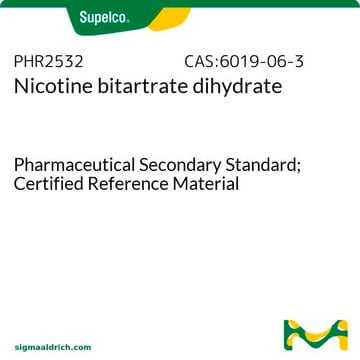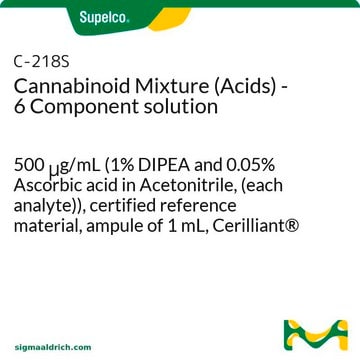N0590200
Nicotine ditartrate
European Pharmacopoeia (EP) Reference Standard
Sinónimos:
(−)-Nicotine hydrogen tartrate salt, (−)-1-Methyl-2-(3-pyridyl)pyrrolidine (+)-bitartrate salt
About This Item
Productos recomendados
grade
pharmaceutical primary standard
API family
nicotine
manufacturer/tradename
EDQM
application(s)
pharmaceutical (small molecule)
format
neat
SMILES string
CN1CCC[C@H]1C2=CC=CN=C2.C
InChI
1S/C10H14N2.CH4/c1-12-7-3-5-10(12)9-4-2-6-11-8-9;/h2,4,6,8,10H,3,5,7H2,1H3;1H4/t10-;/m0./s1
InChI key
RYYKFQGHMYGLEL-PPHPATTJSA-N
¿Está buscando productos similares? Visita Guía de comparación de productos
General description
Application
Biochem/physiol Actions
Packaging
Other Notes
related product
signalword
Danger
Hazard Classifications
Acute Tox. 2 Inhalation - Acute Tox. 3 Oral - Aquatic Chronic 2 - Eye Irrit. 2 - Repr. 2
Storage Class
6.1A - Combustible acute toxic Cat. 1 and 2 / very toxic hazardous materials
wgk_germany
WGK 2
flash_point_f
289.8 °F
flash_point_c
143.2 °C
Elija entre una de las versiones más recientes:
Certificados de análisis (COA)
Lo sentimos, en este momento no disponemos de COAs para este producto en línea.
Si necesita más asistencia, póngase en contacto con Atención al cliente
¿Ya tiene este producto?
Encuentre la documentación para los productos que ha comprado recientemente en la Biblioteca de documentos.
Los clientes también vieron
Nuestro equipo de científicos tiene experiencia en todas las áreas de investigación: Ciencias de la vida, Ciencia de los materiales, Síntesis química, Cromatografía, Analítica y muchas otras.
Póngase en contacto con el Servicio técnico











